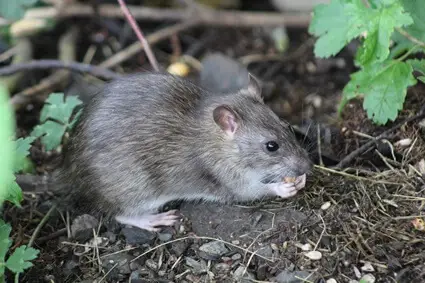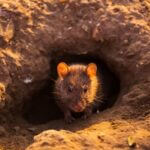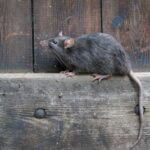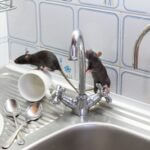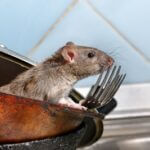Wherever rats are found, they’re considered vermin that must be eradicated. However, most people don’t realize that rats play a vital role in the ecosystem.
Rats are a food source for numerous predators, including bobcats, mountain lions, coyotes, wolves, snakes, falcons, hawks, and owls.
They encourage the growth of new plants and trees by dispersing seeds. These excellent burrowers aerate the soil, making it more conducive to plant growth.
Rats dig extensive burrows and tunnels for shelter. As part of the process, they loosen up the soil, promoting better air circulation and water filtration.
The fact that rats are opportunistic feeders also benefits the environment, as they eat garbage and waste disposed of by humans.
What Do Rats Do For The Environment?
While humans loathe rats, their ecological importance can hardly be overstated.
The reasons rats are a keystone species in the ecosystem include:
Food Source for Predators
Rats act as a primary food source for nearly every type of predator.
Animals that rely on wild rats for food include:
- Weasels.
- Cats.
- Foxes.
- Wolves.
- Snakes.
- Birds of prey, such as eagles, owls, falcons, and hawks.
If all rats were wiped out, most of these predators would decline in numbers and eventually go extinct. As you can imagine, this would cause a ripple effect in the ecosystem and result in imbalances.
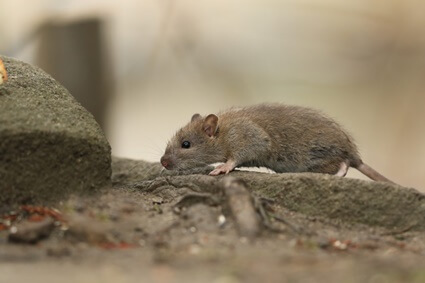
Hosts for Parasites
From a purely human perspective, the fact that rats’ bodies carry parasites such as mites and ticks makes them problematic.
After all, parasites can transmit deadly diseases to humans, such as:
- Plague.
- Hantavirus.
- Salmonellosis.
However, parasites depend on rats for survival in the broader ecological sense.
Reduce Waste
Rats are scavengers and opportunistic feeders that feed on dead plants and animal material.
In domestic settings, rats often consume food waste and animal remains, reducing environmental waste. Without rats, the world would have more dead plants and animals.
Seed Spreaders
Rats play a vital role in spurring the growth of new plants and trees by spreading seeds.
Rats are notorious hoarders that stockpile seeds in their burrows for future consumption. However, they usually don’t eat all the seeds germinating into new plants.
Soil Aeration
Rats are habitual burrowers that dig subterranean pathways and nests in the ground.
In the process, they loosen the soil, improving aeration and water infiltration. Consequently, they make the soil more fertile and conducive to plant growth.
Distribution of Fungi
Wild plants have a symbiotic relationship with fungi in the soil.
Whereas fungi provide plants with essential nutrients, plants give fungi energy to grow and reproduce. The seeds of some plants, such as orchids, won’t grow without being attached to fungi.
According to Austral Ecology, most mycorrhizal fungi lack the mechanisms required for the independent dispersal of spores. These fungi give rise to truffles, which are eaten mainly by rodents, including rats.
Various underground fungi rely almost entirely on rats to spread their spores and facilitate reproduction.
Wild rats carry these fungi long distances through their foraging movements, distributing the spores in new habitats. The spores latch onto plants in their new environment and develop into new fungi.
Scientific Research
Rats have been the preferred species for scientific research worldwide for many generations.
According to Missouri Medicine, rats are desirable as test subjects in biomedical research due to their genetic, anatomical, and physiological similarities to humans.
Due to these commonalities, using rats in biomedical research fosters a greater understanding of human biology, which advances medicine.
What Role Do Rats Play in The Ecosystem?
Perhaps most crucially, rats are intermediate predators in the food chain. Rats feed on different organisms while also serving as food for various predators.
Besides feeding on fruits and vegetables, rats consume small birds, lizards, and fish. This, of course, controls the population of these organisms. In turn, rats are preyed upon by cats, wild dogs, snakes, and birds of prey like owls, eagles, and hawks.
Rats facilitate the propagation of plant life in various ways. For instance, when digging burrows to nest in, rats loosen up the soil, thus promoting better aeration and water flow.
This makes the soil more conducive to new plant growth and ensures existing plants receive the nutrition to survive.
Furthermore, rats aid in seed dispersal and distribution through their hoarding habit, thus promoting the growth of new plants in different areas.
Rats host many external parasites, such as mites and ticks, which rely on rats for sustenance. Of course, they’re usually just as bad as rats, but they wouldn’t survive if all rats were suddenly eradicated.
In addition, underground fungi such as mushrooms depend on rats for seed dispersal. As rats dig up mushrooms for food, they inadvertently distribute their spores, facilitating the growth of new fungi.
How Are Rats Helpful To Humans?
Of course, humans reviled rats for being a nuisance and for their capacity to transmit diseases. However, rats are beneficial to humanity in several ways. The benefit is to do with medical research.
According to the Foundation for Biomedical Research, approximately 95 percent of all animal species used in medical research are rats and mice.
Rats are used in virtually every field of medical research, ranging from developing new drugs for cancer to dietary supplements for humans and much more.
Rats and humans share a lot in common in terms of:
- Biology.
- Genetics.
- Behavioral characteristics.
Rats are also desirable for scientific research due to their:
- Small size.
- Ease of housing.
- Relatively short life spans (about 2-3 years).
Without rats, biomedical research would have developed differently than it is today.
Besides their invaluable role in scientific research, the nature of rats as scavengers reduces human waste. In human settlements, rats feed on kitchen waste and other garbage, thus inadvertently cleaning up the environment and preventing the buildup of dead plant and animal matter.
Without rats, the world would be filled with dead plants and animal material.
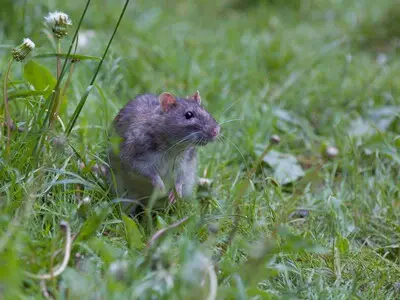
What Would Happen If Rats Went Extinct?
The critical role of rats and mice in the environment can’t be overlooked. The ecosystem would be thrown off balance if all rats suddenly went extinct.
Some of the problems that would arise include:
Disrupted Food Chain
Rats are vital in the food chain since nearly every predator preys on them.
For this reason, the extinction of the rat population would result in fewer feeding options for predators, leading to a steady decline in numbers or even extinction.
Rats are natural predators, feeding primarily on insects, small mammals, birds, and fish. So, if rats suddenly died off, the prey population would increase, creating an imbalance in the ecosystem.
Soil Problems
The burrowing habits of rats promote better soil aeration and water infiltration.
When digging burrows and underground pathways, rats loosen up the soil, encouraging better air circulation and water flow into the soil.
In the absence of rats, soil quality would be reduced. Soil compaction would make it difficult for water, oxygen, and nutrients to reach plant roots for absorption.
As a result, most plants would lack essential nutrients and die off. Likewise, the absence of rats in the ecosystem may hinder the spread of seeds, stalling the growth of plants.
Decline In Biomedical Research
The use of rats in biomedical research has led to impressive advancements in many related fields, including pharmacy, surgery, and medical technology, over several generations.
Medical research would slow down if the rat population were gone. Consequently, there would be fewer developments in drug development and disease control in the future.
Rats are necessary within the ecosystem and for human life, even if considered pest animals.

